Financial Planning And International Organizations
VerifiedAdded on 2022/08/26
|5
|1586
|18
AI Summary
Contribute Materials
Your contribution can guide someone’s learning journey. Share your
documents today.
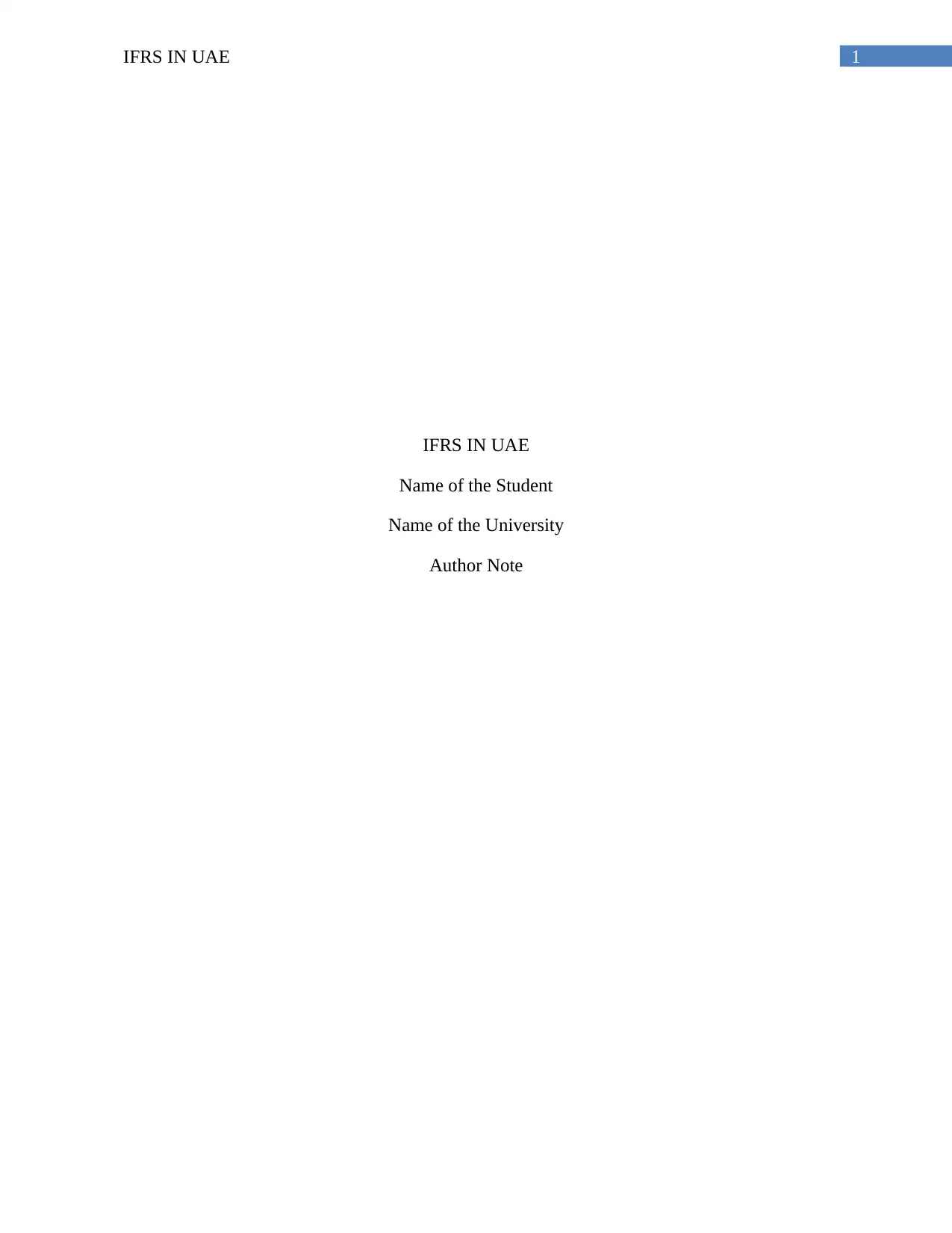
1IFRS IN UAE
IFRS IN UAE
Name of the Student
Name of the University
Author Note
IFRS IN UAE
Name of the Student
Name of the University
Author Note
Secure Best Marks with AI Grader
Need help grading? Try our AI Grader for instant feedback on your assignments.
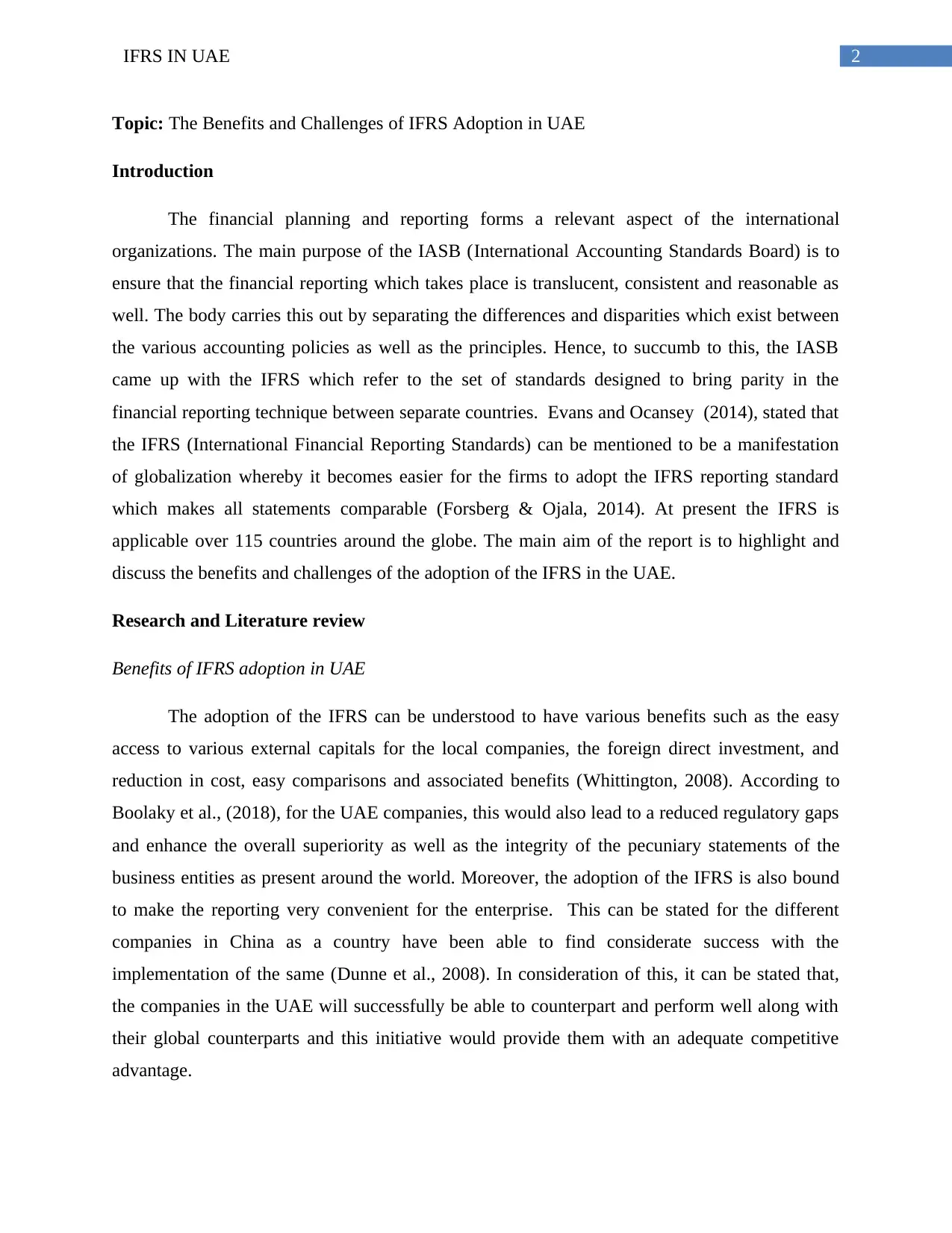
2IFRS IN UAE
Topic: The Benefits and Challenges of IFRS Adoption in UAE
Introduction
The financial planning and reporting forms a relevant aspect of the international
organizations. The main purpose of the IASB (International Accounting Standards Board) is to
ensure that the financial reporting which takes place is translucent, consistent and reasonable as
well. The body carries this out by separating the differences and disparities which exist between
the various accounting policies as well as the principles. Hence, to succumb to this, the IASB
came up with the IFRS which refer to the set of standards designed to bring parity in the
financial reporting technique between separate countries. Evans and Ocansey (2014), stated that
the IFRS (International Financial Reporting Standards) can be mentioned to be a manifestation
of globalization whereby it becomes easier for the firms to adopt the IFRS reporting standard
which makes all statements comparable (Forsberg & Ojala, 2014). At present the IFRS is
applicable over 115 countries around the globe. The main aim of the report is to highlight and
discuss the benefits and challenges of the adoption of the IFRS in the UAE.
Research and Literature review
Benefits of IFRS adoption in UAE
The adoption of the IFRS can be understood to have various benefits such as the easy
access to various external capitals for the local companies, the foreign direct investment, and
reduction in cost, easy comparisons and associated benefits (Whittington, 2008). According to
Boolaky et al., (2018), for the UAE companies, this would also lead to a reduced regulatory gaps
and enhance the overall superiority as well as the integrity of the pecuniary statements of the
business entities as present around the world. Moreover, the adoption of the IFRS is also bound
to make the reporting very convenient for the enterprise. This can be stated for the different
companies in China as a country have been able to find considerate success with the
implementation of the same (Dunne et al., 2008). In consideration of this, it can be stated that,
the companies in the UAE will successfully be able to counterpart and perform well along with
their global counterparts and this initiative would provide them with an adequate competitive
advantage.
Topic: The Benefits and Challenges of IFRS Adoption in UAE
Introduction
The financial planning and reporting forms a relevant aspect of the international
organizations. The main purpose of the IASB (International Accounting Standards Board) is to
ensure that the financial reporting which takes place is translucent, consistent and reasonable as
well. The body carries this out by separating the differences and disparities which exist between
the various accounting policies as well as the principles. Hence, to succumb to this, the IASB
came up with the IFRS which refer to the set of standards designed to bring parity in the
financial reporting technique between separate countries. Evans and Ocansey (2014), stated that
the IFRS (International Financial Reporting Standards) can be mentioned to be a manifestation
of globalization whereby it becomes easier for the firms to adopt the IFRS reporting standard
which makes all statements comparable (Forsberg & Ojala, 2014). At present the IFRS is
applicable over 115 countries around the globe. The main aim of the report is to highlight and
discuss the benefits and challenges of the adoption of the IFRS in the UAE.
Research and Literature review
Benefits of IFRS adoption in UAE
The adoption of the IFRS can be understood to have various benefits such as the easy
access to various external capitals for the local companies, the foreign direct investment, and
reduction in cost, easy comparisons and associated benefits (Whittington, 2008). According to
Boolaky et al., (2018), for the UAE companies, this would also lead to a reduced regulatory gaps
and enhance the overall superiority as well as the integrity of the pecuniary statements of the
business entities as present around the world. Moreover, the adoption of the IFRS is also bound
to make the reporting very convenient for the enterprise. This can be stated for the different
companies in China as a country have been able to find considerate success with the
implementation of the same (Dunne et al., 2008). In consideration of this, it can be stated that,
the companies in the UAE will successfully be able to counterpart and perform well along with
their global counterparts and this initiative would provide them with an adequate competitive
advantage.
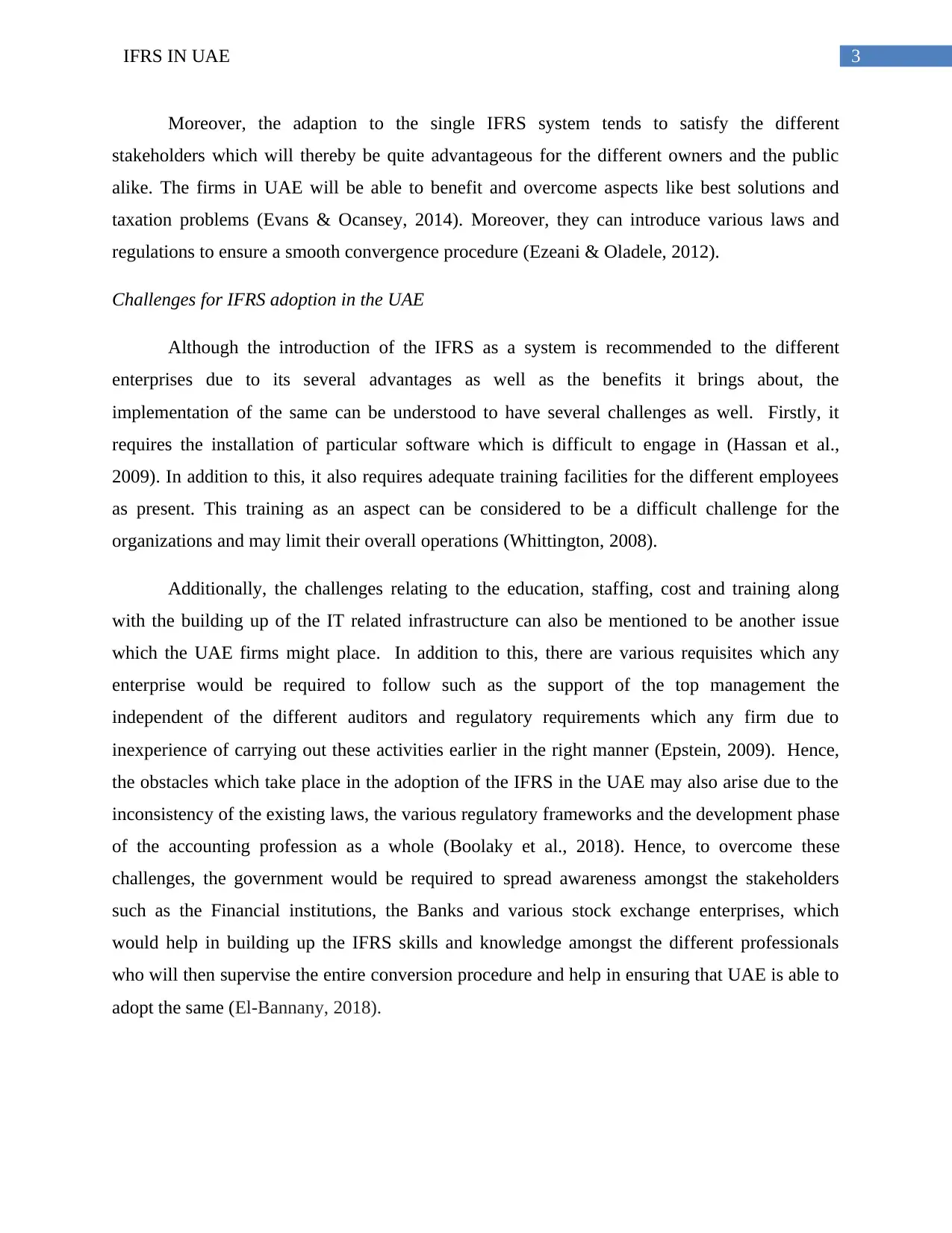
3IFRS IN UAE
Moreover, the adaption to the single IFRS system tends to satisfy the different
stakeholders which will thereby be quite advantageous for the different owners and the public
alike. The firms in UAE will be able to benefit and overcome aspects like best solutions and
taxation problems (Evans & Ocansey, 2014). Moreover, they can introduce various laws and
regulations to ensure a smooth convergence procedure (Ezeani & Oladele, 2012).
Challenges for IFRS adoption in the UAE
Although the introduction of the IFRS as a system is recommended to the different
enterprises due to its several advantages as well as the benefits it brings about, the
implementation of the same can be understood to have several challenges as well. Firstly, it
requires the installation of particular software which is difficult to engage in (Hassan et al.,
2009). In addition to this, it also requires adequate training facilities for the different employees
as present. This training as an aspect can be considered to be a difficult challenge for the
organizations and may limit their overall operations (Whittington, 2008).
Additionally, the challenges relating to the education, staffing, cost and training along
with the building up of the IT related infrastructure can also be mentioned to be another issue
which the UAE firms might place. In addition to this, there are various requisites which any
enterprise would be required to follow such as the support of the top management the
independent of the different auditors and regulatory requirements which any firm due to
inexperience of carrying out these activities earlier in the right manner (Epstein, 2009). Hence,
the obstacles which take place in the adoption of the IFRS in the UAE may also arise due to the
inconsistency of the existing laws, the various regulatory frameworks and the development phase
of the accounting profession as a whole (Boolaky et al., 2018). Hence, to overcome these
challenges, the government would be required to spread awareness amongst the stakeholders
such as the Financial institutions, the Banks and various stock exchange enterprises, which
would help in building up the IFRS skills and knowledge amongst the different professionals
who will then supervise the entire conversion procedure and help in ensuring that UAE is able to
adopt the same (El-Bannany, 2018).
Moreover, the adaption to the single IFRS system tends to satisfy the different
stakeholders which will thereby be quite advantageous for the different owners and the public
alike. The firms in UAE will be able to benefit and overcome aspects like best solutions and
taxation problems (Evans & Ocansey, 2014). Moreover, they can introduce various laws and
regulations to ensure a smooth convergence procedure (Ezeani & Oladele, 2012).
Challenges for IFRS adoption in the UAE
Although the introduction of the IFRS as a system is recommended to the different
enterprises due to its several advantages as well as the benefits it brings about, the
implementation of the same can be understood to have several challenges as well. Firstly, it
requires the installation of particular software which is difficult to engage in (Hassan et al.,
2009). In addition to this, it also requires adequate training facilities for the different employees
as present. This training as an aspect can be considered to be a difficult challenge for the
organizations and may limit their overall operations (Whittington, 2008).
Additionally, the challenges relating to the education, staffing, cost and training along
with the building up of the IT related infrastructure can also be mentioned to be another issue
which the UAE firms might place. In addition to this, there are various requisites which any
enterprise would be required to follow such as the support of the top management the
independent of the different auditors and regulatory requirements which any firm due to
inexperience of carrying out these activities earlier in the right manner (Epstein, 2009). Hence,
the obstacles which take place in the adoption of the IFRS in the UAE may also arise due to the
inconsistency of the existing laws, the various regulatory frameworks and the development phase
of the accounting profession as a whole (Boolaky et al., 2018). Hence, to overcome these
challenges, the government would be required to spread awareness amongst the stakeholders
such as the Financial institutions, the Banks and various stock exchange enterprises, which
would help in building up the IFRS skills and knowledge amongst the different professionals
who will then supervise the entire conversion procedure and help in ensuring that UAE is able to
adopt the same (El-Bannany, 2018).
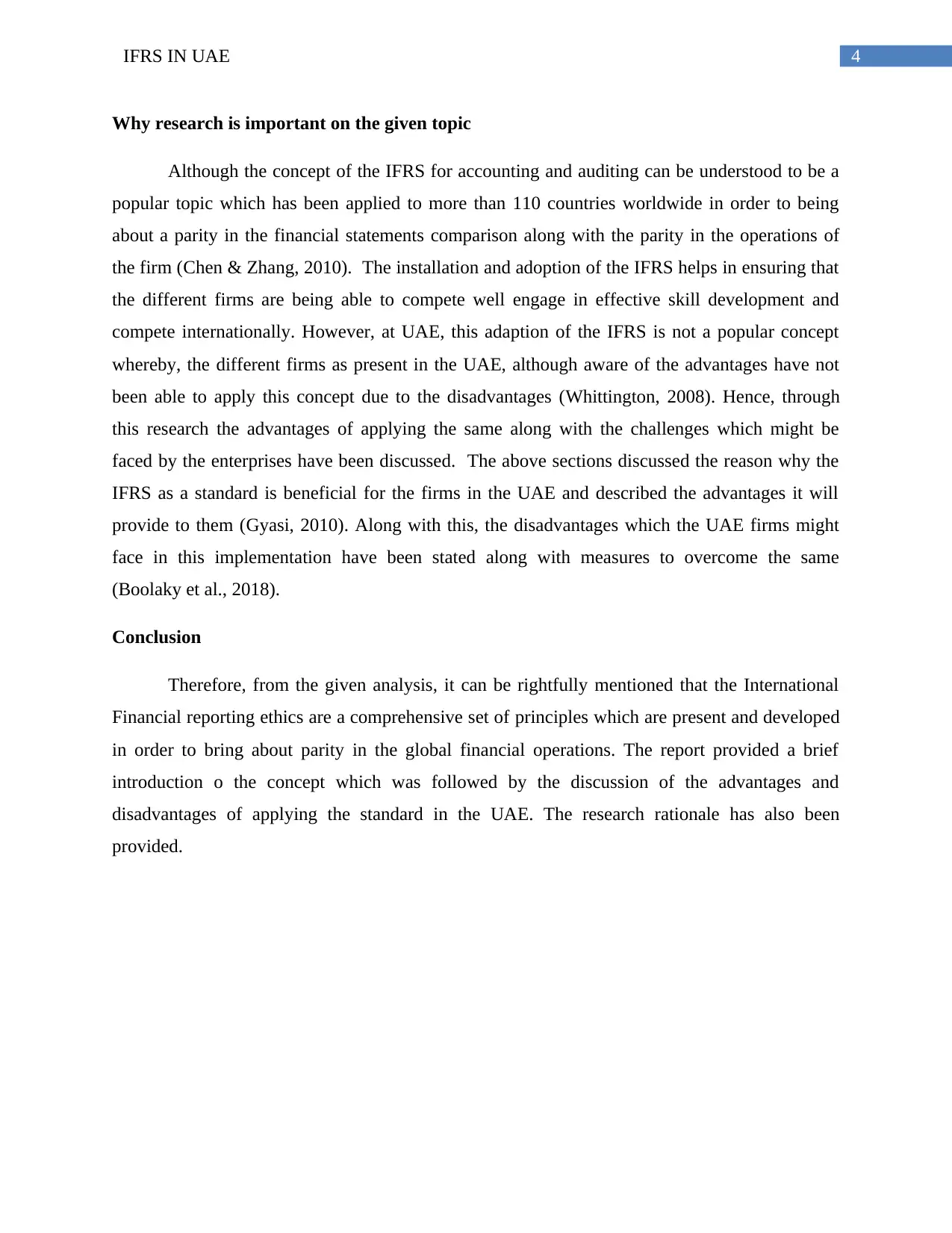
4IFRS IN UAE
Why research is important on the given topic
Although the concept of the IFRS for accounting and auditing can be understood to be a
popular topic which has been applied to more than 110 countries worldwide in order to being
about a parity in the financial statements comparison along with the parity in the operations of
the firm (Chen & Zhang, 2010). The installation and adoption of the IFRS helps in ensuring that
the different firms are being able to compete well engage in effective skill development and
compete internationally. However, at UAE, this adaption of the IFRS is not a popular concept
whereby, the different firms as present in the UAE, although aware of the advantages have not
been able to apply this concept due to the disadvantages (Whittington, 2008). Hence, through
this research the advantages of applying the same along with the challenges which might be
faced by the enterprises have been discussed. The above sections discussed the reason why the
IFRS as a standard is beneficial for the firms in the UAE and described the advantages it will
provide to them (Gyasi, 2010). Along with this, the disadvantages which the UAE firms might
face in this implementation have been stated along with measures to overcome the same
(Boolaky et al., 2018).
Conclusion
Therefore, from the given analysis, it can be rightfully mentioned that the International
Financial reporting ethics are a comprehensive set of principles which are present and developed
in order to bring about parity in the global financial operations. The report provided a brief
introduction o the concept which was followed by the discussion of the advantages and
disadvantages of applying the standard in the UAE. The research rationale has also been
provided.
Why research is important on the given topic
Although the concept of the IFRS for accounting and auditing can be understood to be a
popular topic which has been applied to more than 110 countries worldwide in order to being
about a parity in the financial statements comparison along with the parity in the operations of
the firm (Chen & Zhang, 2010). The installation and adoption of the IFRS helps in ensuring that
the different firms are being able to compete well engage in effective skill development and
compete internationally. However, at UAE, this adaption of the IFRS is not a popular concept
whereby, the different firms as present in the UAE, although aware of the advantages have not
been able to apply this concept due to the disadvantages (Whittington, 2008). Hence, through
this research the advantages of applying the same along with the challenges which might be
faced by the enterprises have been discussed. The above sections discussed the reason why the
IFRS as a standard is beneficial for the firms in the UAE and described the advantages it will
provide to them (Gyasi, 2010). Along with this, the disadvantages which the UAE firms might
face in this implementation have been stated along with measures to overcome the same
(Boolaky et al., 2018).
Conclusion
Therefore, from the given analysis, it can be rightfully mentioned that the International
Financial reporting ethics are a comprehensive set of principles which are present and developed
in order to bring about parity in the global financial operations. The report provided a brief
introduction o the concept which was followed by the discussion of the advantages and
disadvantages of applying the standard in the UAE. The research rationale has also been
provided.
Secure Best Marks with AI Grader
Need help grading? Try our AI Grader for instant feedback on your assignments.
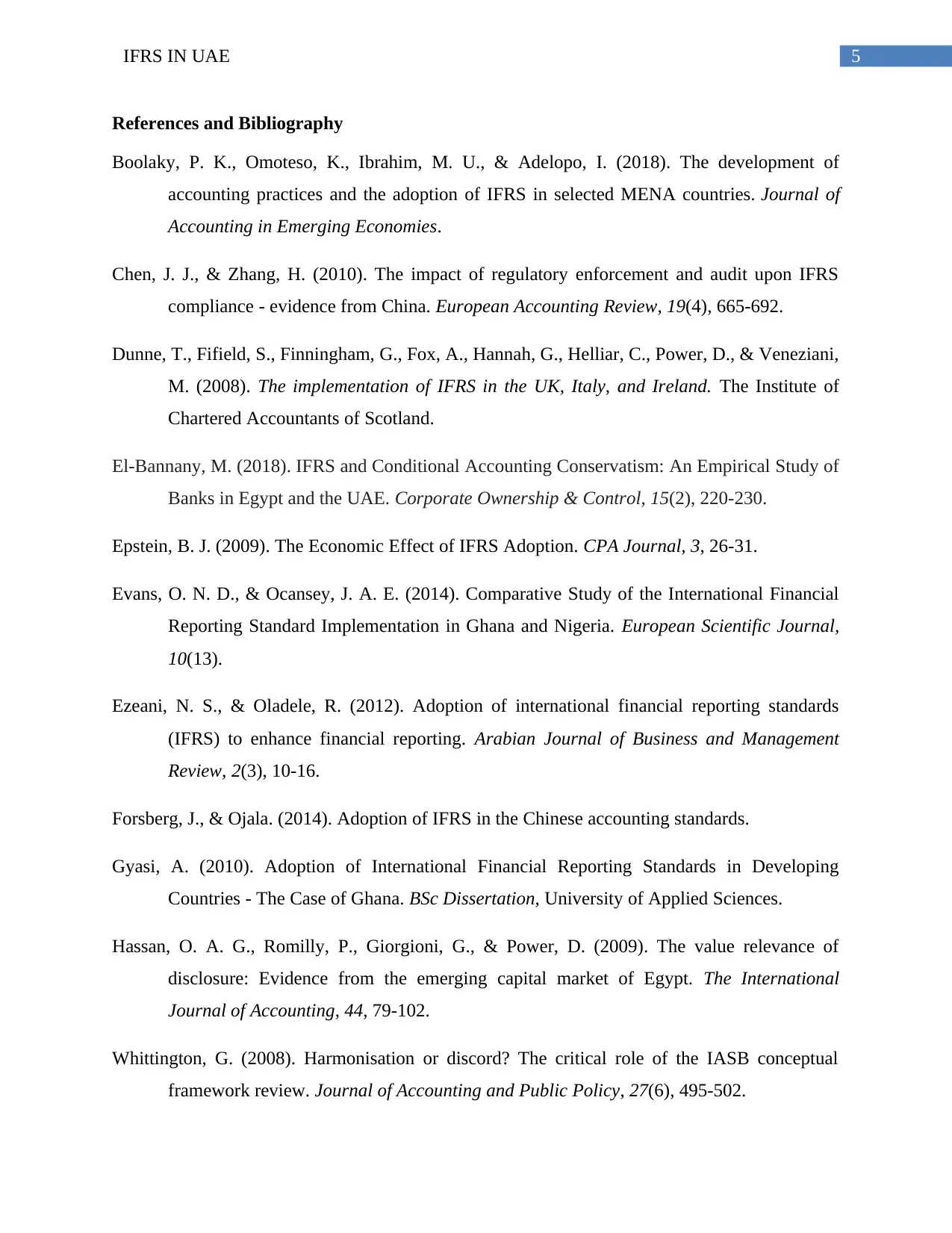
5IFRS IN UAE
References and Bibliography
Boolaky, P. K., Omoteso, K., Ibrahim, M. U., & Adelopo, I. (2018). The development of
accounting practices and the adoption of IFRS in selected MENA countries. Journal of
Accounting in Emerging Economies.
Chen, J. J., & Zhang, H. (2010). The impact of regulatory enforcement and audit upon IFRS
compliance - evidence from China. European Accounting Review, 19(4), 665-692.
Dunne, T., Fifield, S., Finningham, G., Fox, A., Hannah, G., Helliar, C., Power, D., & Veneziani,
M. (2008). The implementation of IFRS in the UK, Italy, and Ireland. The Institute of
Chartered Accountants of Scotland.
El-Bannany, M. (2018). IFRS and Conditional Accounting Conservatism: An Empirical Study of
Banks in Egypt and the UAE. Corporate Ownership & Control, 15(2), 220-230.
Epstein, B. J. (2009). The Economic Effect of IFRS Adoption. CPA Journal, 3, 26-31.
Evans, O. N. D., & Ocansey, J. A. E. (2014). Comparative Study of the International Financial
Reporting Standard Implementation in Ghana and Nigeria. European Scientific Journal,
10(13).
Ezeani, N. S., & Oladele, R. (2012). Adoption of international financial reporting standards
(IFRS) to enhance financial reporting. Arabian Journal of Business and Management
Review, 2(3), 10-16.
Forsberg, J., & Ojala. (2014). Adoption of IFRS in the Chinese accounting standards.
Gyasi, A. (2010). Adoption of International Financial Reporting Standards in Developing
Countries - The Case of Ghana. BSc Dissertation, University of Applied Sciences.
Hassan, O. A. G., Romilly, P., Giorgioni, G., & Power, D. (2009). The value relevance of
disclosure: Evidence from the emerging capital market of Egypt. The International
Journal of Accounting, 44, 79-102.
Whittington, G. (2008). Harmonisation or discord? The critical role of the IASB conceptual
framework review. Journal of Accounting and Public Policy, 27(6), 495-502.
References and Bibliography
Boolaky, P. K., Omoteso, K., Ibrahim, M. U., & Adelopo, I. (2018). The development of
accounting practices and the adoption of IFRS in selected MENA countries. Journal of
Accounting in Emerging Economies.
Chen, J. J., & Zhang, H. (2010). The impact of regulatory enforcement and audit upon IFRS
compliance - evidence from China. European Accounting Review, 19(4), 665-692.
Dunne, T., Fifield, S., Finningham, G., Fox, A., Hannah, G., Helliar, C., Power, D., & Veneziani,
M. (2008). The implementation of IFRS in the UK, Italy, and Ireland. The Institute of
Chartered Accountants of Scotland.
El-Bannany, M. (2018). IFRS and Conditional Accounting Conservatism: An Empirical Study of
Banks in Egypt and the UAE. Corporate Ownership & Control, 15(2), 220-230.
Epstein, B. J. (2009). The Economic Effect of IFRS Adoption. CPA Journal, 3, 26-31.
Evans, O. N. D., & Ocansey, J. A. E. (2014). Comparative Study of the International Financial
Reporting Standard Implementation in Ghana and Nigeria. European Scientific Journal,
10(13).
Ezeani, N. S., & Oladele, R. (2012). Adoption of international financial reporting standards
(IFRS) to enhance financial reporting. Arabian Journal of Business and Management
Review, 2(3), 10-16.
Forsberg, J., & Ojala. (2014). Adoption of IFRS in the Chinese accounting standards.
Gyasi, A. (2010). Adoption of International Financial Reporting Standards in Developing
Countries - The Case of Ghana. BSc Dissertation, University of Applied Sciences.
Hassan, O. A. G., Romilly, P., Giorgioni, G., & Power, D. (2009). The value relevance of
disclosure: Evidence from the emerging capital market of Egypt. The International
Journal of Accounting, 44, 79-102.
Whittington, G. (2008). Harmonisation or discord? The critical role of the IASB conceptual
framework review. Journal of Accounting and Public Policy, 27(6), 495-502.
1 out of 5
Related Documents
Your All-in-One AI-Powered Toolkit for Academic Success.
+13062052269
info@desklib.com
Available 24*7 on WhatsApp / Email
![[object Object]](/_next/static/media/star-bottom.7253800d.svg)
Unlock your academic potential
© 2024 | Zucol Services PVT LTD | All rights reserved.





